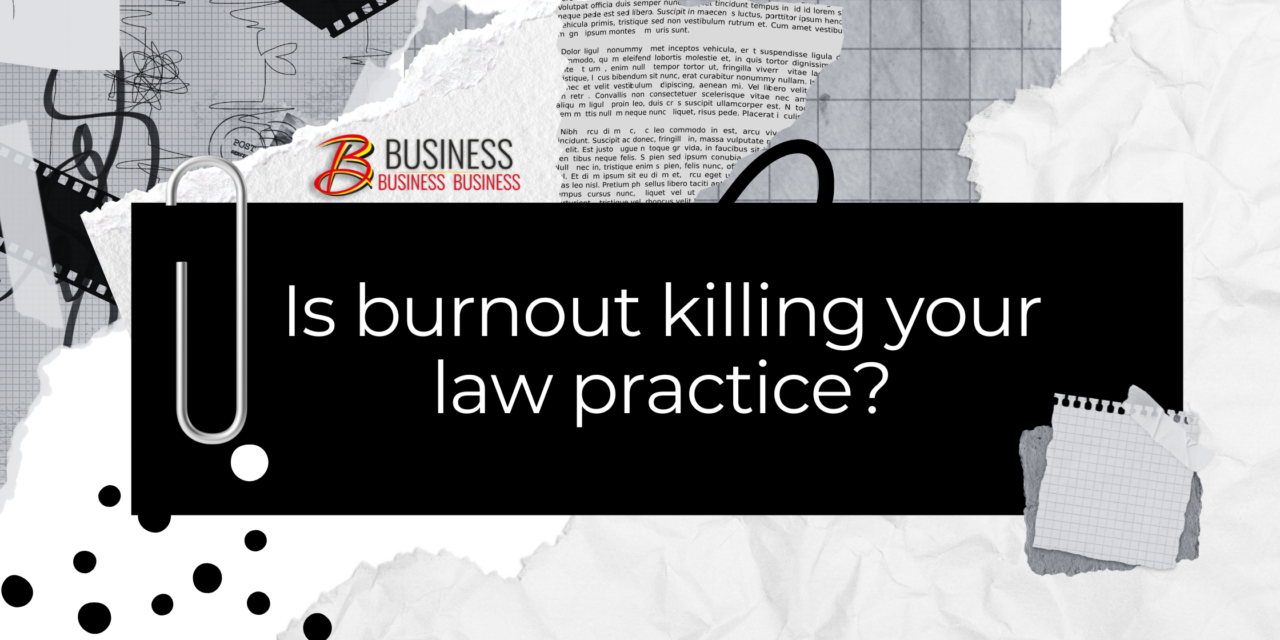Are you sick and tired of hearing about burnout? Me too! But- statistics show it’s on the rise.
The legal profession in Australia is well-known for its high-pressure environment, long hours, and relentless demands. But while we’re busy pushing through deadlines and striving to meet client expectations, we often neglect the foundations of our performance—our health. Poor health can quietly undermine your practice, impacting productivity, client satisfaction, and your bottom line.
How can we start to reclaim control and create a healthier, more resilient work environment? By taking back just 20% more control over your health using my VITAL tool, which assesses Vitality, Intake, Thriving through Exercise, Adaptability, and Leisure.
The Hidden Cost of Poor Health in Law Practices
The legal industry in Australia faces some of the highest rates of burnout, depression, and stress among professionals. A study by the University of Sydney found that nearly one-third of solicitors and one in five barristers reported high or very high levels of psychological distress. This is more than twice the rate found in the general population. The demanding nature of the work, combined with long hours and high expectations, can take a severe toll on mental and physical health, affecting not just individual lawyers but the entire practice.
Research by the Tristan Jepson Memorial Foundation reveals that 63% of lawyers report that their job is negatively impacting their mental health, and many attribute this to factors like unmanageable workloads, lack of support, and unrealistic client demands. These health issues can manifest in decreased performance, increased mistakes, and ultimately, a decline in the quality of service provided to clients.
The financial impact is also significant. The absenteeism costs associated with mental health issues in the Australian workplace are estimated at $10.9 billion per year, with a substantial portion of this affecting law practices. Presenteeism or quiet quitting—when lawyers are physically present but not functioning optimally due to health issues—can be even more damaging. It’s estimated that for every $1 lost to absenteeism, $6 is lost due to presenteeism, significantly impacting productivity and client satisfaction. Team members who are ‘quiet quitters’ and disengaged spread their energy like a virus through teams. Proactive approaches to prevent this always work better than reactive and reactionary strategies.
Are HR Issues Really Health Issues?
Many challenges faced by law practices, from high turnover rates to decreased productivity and increased errors, are often seen as HR issues. However, at their core, many of these challenges are health-related. Burnout, presenteeism, and even workplace conflicts often stem from poor health and well-being. High-performing practices don’t just hire the best legal minds; they nurture teams and connections by fostering an environment where health is modelled and prioritised.
Leaders who prioritise their well-being set a powerful example for their teams. Yet, many in leadership roles within law practices are the first to sacrifice their health for the job, inadvertently sending the message that work comes first. A report by the Minds Count Foundation (formerly the Tristan Jepson Memorial Foundation) underscores that 75% of lawyers believe that a healthier workplace would improve their overall performance and job satisfaction.
Research from the American Bar Association indicates that up to 21% of lawyers qualify as problem drinkers, 28% struggle with depression, and 19% exhibit symptoms of anxiety. High stress, poor work-life balance, and constant pressure to perform can take a heavy toll on physical and mental health. A study by ALM Intelligence found that 74% of law practices don’t have adequate mental health resources or initiatives in place, despite 64% of legal professionals believing that their practice’s culture contributed to stress.
The VITAL Approach: Reclaiming 20% More Control
So, how do you start to make a change? It’s not about drastic lifestyle overhauls but about reclaiming just 20% more control over your health. My VITAL tool helps individuals assess which of the 5 areas to focus on to make small, sustainable changes:
- Vitality: Energy management is crucial in high performance environments like law practices. Are you constantly feeling drained? Do you feel a sense of purpose? How do you align your personal values with your work? Do you have passions, inside and outside of work?
- Intake (Food/Hydration): Are you fueling your body for optimal performance? Pay attention to how what you eat impacts how you feel. Poor nutrition and dehydration can impair cognitive function, leading to poor decision-making and increased errors- far from ideal in the legal environment
- Thriving through Movement: Regular movement, even if it’s just a walk during a lunch break, can boost mood, improve focus, and increase resilience. Law practices often promote desk based, sedentary lifestyles- integrating ‘movement snacks’ throughout the day and setting aside time for exercise can produce big gains in purpose and productivity.
- Adaptability: The legal field is inherently unpredictable, with last-minute changes and constant client demands. Building adaptability skills and a growth mindset can help you manage these challenges more effectively. Reframing our attitudes towards stress, working actively to build resilience and putting healthy boundaries in place to allow for optimum habits are essential to become more adaptable to change.
- Leisure: Do you make time to unwind and relax in an energising way outside of work? While it may be tempting to relax with Netflix and a bottle of wine after a hard day, non- energising use of our downtime like this regularly contributes to poor sleep, mood changes, altered productivity and low energy in the long run. Cultivate your hobbies, connections, presence, device disconnection and energising restful practices so you can best recharge for your days.
By assessing where you stand in each of these areas and aiming for just a 20% improvement, you’re setting yourself and your practice on a path to better health and performance. The goal isn’t perfection but progress. Every step you take toward better health is a step toward a more productive, engaged, and resilient practice. Your future self will thank you for it!
Download my free VITAL health tool, time tracker & boundary-setting tool on www.suzannerath.com.au.




















